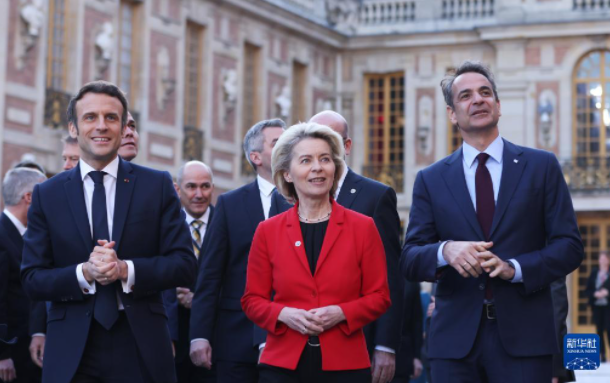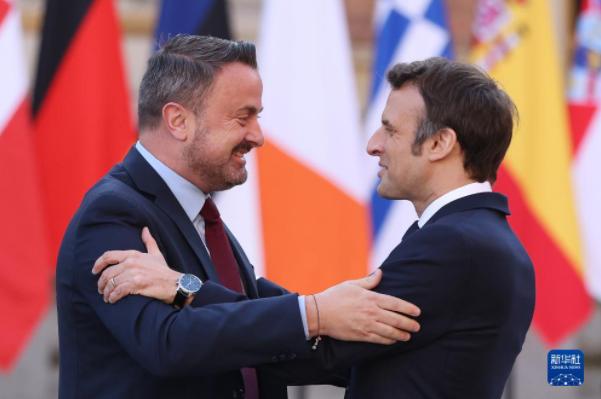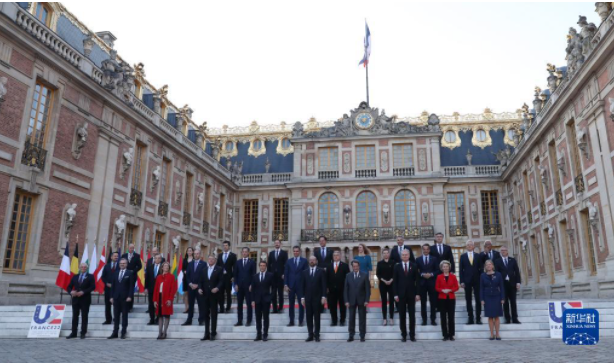Xinhua News Agency, Paris, March 11 (International Watch) The EU summit focuses on the crisis and wants to be independent, but there are many differences
The two-day informal meeting of leaders of EU member states ended on the 11th at the Palace of Versailles on the southwestern outskirts of Paris, France. The summit was supposed to discuss “new growth and investment models”, but the military conflict between Russia and Ukraine has become a global focus, and the meeting was devoted to discussing the political and economic implications of the matter in Europe.
Analysts pointed out that the conflict between Russia and Ukraine highlights the importance of the issue of European strategic autonomy. The Versailles Declaration adopted at the summit made joint commitments on enhancing European defense capabilities, promoting energy independence, and promoting economic growth. However, this declaration can hardly hide the many differences within the EU, and the EU still has a long way to go to achieve strategic autonomy.
On March 10, at the Palace of Versailles on the outskirts of Paris, France, the leaders of the meeting took family photos.Photo by Xinhua News Agency reporter Gao Jing
Ukraine’s accession to the EU ‘not accelerating’
After the Russian-Ukrainian military conflict broke out, Ukrainian President Volodymyr Zelensky signed Ukraine’s application to join the EU on February 28, calling on the EU to initiate “new special procedures” to quickly absorb Ukraine. The issue of Ukraine’s accession to the EU has thus become a focus of the summit. Although Uzbekistan is eager to join the alliance, the 27 EU countries ruled out the possibility of Uzbekistan joining the alliance at the summit.
The Versailles Declaration only mentioned that the EU is willing to further deepen its partnership with Ukraine, and the European Commission will make comments in accordance with relevant regulations. Some EU leaders even expressed their opposition to Ukraine’s rapid accession to the EU. Dutch Prime Minister Rutte told the media: “There is no quick (joint) procedure.” French President Emmanuel Macron also made it clear at a press conference before the summit that he would not support Ukraine’s membership in the “short term”.
According to French media reports, except for Poland, the Czech Republic, and Slovenia, which have clearly expressed their support for Ukraine’s rapid accession to the EU, most other countries are cautious. The French presidency told media: “Within the European Council, there is not a majority of countries agreeing to speed up Ukraine’s accession process.”

On March 10, at the Palace of Versailles near Paris, France, French President Emmanuel Macron (left), European Commission President von der Leyen (middle) and others entered the venue.Photo by Xinhua News Agency reporter Gao Jing
“Decoupling” from Russia “take your time”
The Russian-Ukrainian conflict and the new wave of sanctions against Russia by the West have highlighted the issue of European energy security, which has also become one of the focuses of this summit. Under the Versailles Declaration, EU member states agreed to “phasing out as quickly as possible” their dependence on Russian gas, oil and coal. European Commission President von der Leyen has proposed that the EU stop using Russian fossil fuels by 2027. To this end, the European Commission will put forward a plan to ensure the security of energy supply in the next winter under the premise of affordability at the end of March this year, and submit the REPowerEU plan aimed at accelerating the transition to clean energy and improving energy independence by May.
The French newspaper Les Echos pointed out that the United States announced not long ago that it would stop importing Russian gas and oil, putting “a lot of pressure” on the European Union. There have been differences within the EU. Poland and the three Baltic countries have actively asked the EU to impose an embargo on Russian oil and natural gas, but Germany, Austria, Finland, Hungary and other countries that are highly dependent on Russia’s energy said that they should not “act in a hurry”, saying that the energy switch does not work. Possibly “closed overnight”. Frans Timmermans, executive vice-president of the European Commission, even warned that the “decoupling” of European and Russian energy could cause “more harm” than the Ukraine crisis.
According to the French “Le Figaro” report, many European countries are heavily dependent on Russia for energy. Russia is Europe’s largest natural gas supplier, and about 40% of the EU’s natural gas imports and about 30% of its imported crude oil come from Russia. About 55% of Germany’s natural gas imports come from Russia; about 20% of France’s natural gas imports come from Russia, and about a quarter of the 25 million tons of diesel imported in 2020 came from Russia.
The French presidential palace has previously made it clear that although the United States announced a ban on the import of Russian oil and natural gas, France will not “immediately ban” it. Because the United States has no dependence on it, but European countries are different.

French President Emmanuel Macron (right) welcomes Luxembourg Prime Minister Bertel at the Palace of Versailles on the outskirts of Paris, France, on March 10.Photo by Xinhua News Agency reporter Gao Jing
Funding issue ‘divisive’
Some media pointed out that the Ukrainian crisis exposed the EU’s strong dependence on foreign countries in many aspects such as defense and agriculture. Thierry de Montbrillard, president of the French Institute of International Relations, stated that only by gradually getting rid of its dependence on the United States can European defense truly move towards strategic independence. sex”.
In order to achieve strategic autonomy, the Versailles Declaration pointed out that EU member states must resolutely increase investment in defense capabilities and innovative technologies, promote the EU to strengthen the construction of “sovereignty” and reduce strategic dependence in these areas.
However, according to the French “Le Monde” report, there are differences within the EU on the financial support needed to strengthen the strategic “sovereignty”. France wants to push for a “European Resilience Plan”, financed by the 27 EU nations in the form of debt. However, Germany, the Netherlands, Denmark, Finland and other countries have reservations about this, arguing that the 750 billion euro recovery fund previously established to deal with the new crown epidemic and its economic impact still has a balance of 500 billion euros, and there is absolutely no need to establish new joint debts.
Analysts pointed out that the Russian-Ukrainian conflict has made the EU realize the importance of strategic autonomy, but as shown at this summit, EU countries have different interests. To truly achieve strategic autonomy, the EU may still have a long way to go.
